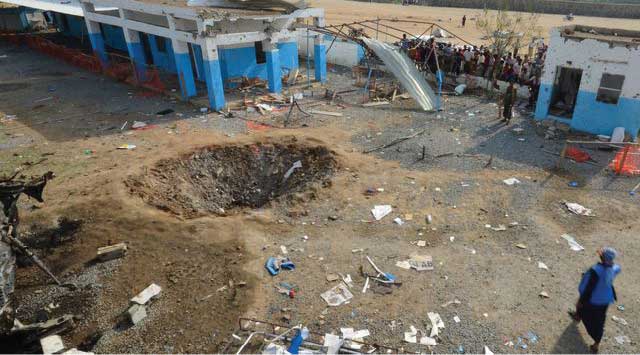
In 2016, we submitted to the UN Mechanisms 21 communications regarding 7 individuals.

YEMEN
 Our Concerns
Our Concerns
- High number of civilian casualties as a result of the indiscriminate airstrikes and continued fighting on both sides;
- Massive internal displacement;
- Shortage of medical supplies and foodstuffs, leading to the outbreak of diseases and famine;
- Widespread practice of enforced disappearance and incommunicado detention;
- Arbitrary detentions and resort to torture and other cruel, inhuman or degrading treatment.
 Recommendations
Recommendations
- Ensure respect for the principles of international humanitarian law and international human rights law by all parties to the conflict;
- Take effective steps to bring an end to the practice of enforced disappearance and incommunicado detention;
- Take effective measures to end the practice of torture and other cruel, inhuman or degrading treatment;
- Establish an International Independent Commission of Inquiry to investigate violations of international humanitarian law and human rights by all parties.
 Upcoming
Upcoming
- Renewed rounds of peace talks headed by UN envoy, Ould Cheikh Ahmed.
In August 2016, the UN confirmed that since the start of the Yemeni conflict in 2014, more than 10,000 people had lost their lives. This year saw the continuation of hostilities, with violent ground battles between the different factions and relentless airstrikes conducted by the Saudi-led coalition, which repeatedly targeted civilian areas. Indeed, massive civilian casualties were recorded this year and the destruction of civilian infrastructure, paired with restrictions on the import of food and fuel, has entrenched a severe humanitarian emergency. UN figures show that around three million people are now internally displaced within Yemen; an estimated seven million Yemenis are food insecure, with 370,000 children under the age of five at risk of starving to death. The humanitarian crisis is further exacerbated by the fact that the healthcare sector has been severely hindered, with the most facilities functioning only partly, if at all, as a result of airstrikes, among other factors.
In April 2016, UN brokered negotiations to reach a peace agreement took place in Kuwait, but collapsed as the Houthi-Saleh coalition rejected the proposal. In October, another peace plan was proposed by UN envoy, Ismail Ould Cheikh Ahmed, which was in turn rejected by the Hadi government. The plan is rumoured to have side-lined President Hadi and suggested the establishment of a new government composed of less divisive figures, including representatives of the Houthi-Saleh coalition.

Heavy civilian toll due to indiscriminate airstrikes
The Saudi-led coalition airstrikes in support of the Hadi government continued in Yemen throughout 2016, significantly increasing the number of civilian casualties. Many of the coalition’s airstrikes were found to be indiscriminate, increasing the number of civilian casualties significantly.
In August 2016, and in defiance of international humanitarian law, the coalition hit a Doctors Without Borders (MSF) hospital. In less than a year, MSF facilities have been struck on four separate occasions; the last strike in August prompted the organisation’s withdrawal from northern Yemen, due to its “loss of confidence in the Saudi-led coalition to prevent such fatal attacks”. MSF medical facilities were hit despite the fact that the organisation has systematically shared the GPS coordinates of hospitals in which it operates with all parties involved. The partial MSF withdrawal is catastrophic for Yemen, given the fact that its own healthcare infrastructure has become increasingly ineffective, with very few facilities still in operation.
During the same month, the Saudi-led coalition also targeted a school in northern Yemen, where children were sitting their exams. The airstrike killed 10 children and injured 28 more, all of whom were between 5 and 15 years old. Indeed, earlier in June, the UN Secretary General (UNSG) stated that there had been 1,953 child casualties in 2016, 60% of which could be attributed to the Saudi-led coalition. In the UNSG annual report, the Saudi-led coalition was placed on a blacklist for killing and maiming children and for its attacks on schools and hospitals in Yemen. Airstrikes targeting the civilian populations, as well as civilian objects such as “medical units” and “buildings dedicated to education”, are considered serious violations of international humanitarian law, much of which has attained the status of customary international law. If it were found that these targets were struck deliberately, the airstrikes would amount to war crimes. Indiscriminate attacks can also amount to war crimes if the “incidental” civilian deaths were excessive in comparison with the anticipated military advantage sought. In any event, the aforementioned airstrikes must be independently investigated and the perpetrators brought to justice.
In March 2016, the United Nations High Commissioner for Human Rights (OHCHR) stressed that his office was “possibly looking at the commission of international crimes by members of the Coalition” and reminded the coalition of its obligation “to distinguish at all times between military targets and civilians”. The OHCHR further called on Saudi-led coalition forces to “take effective actions to prevent the recurrence of such incidents, and to publish transparent, independent investigations into those that have already occurred”.

Continuation of the practice of enforced disappearances
The practice of enforced disappearance, an issue that has plagued Yemen since the 1970s, made a forceful return since the start of the hostilities. All parties have resorted to this tool as a weapon of repression and have targeted activists and journalists, in particular. Alkarama recalls that in the context of Yemen, the systematic practice of enforced disappearance may amount to a crime against humanity under the Rome Statute.
To this day, large numbers of people continue to be forcibly disappeared. Rachid Al Daifi, a student arrested in 2012 for his alleged participation in anti-government protests, is one such example; Amine Al Chafaq, a human rights defender arrested in October 2015 along with 28 other activists and journalists for planning a march to urge the authorities to provide drinking water to the besieged city of Taiz, is another. Yet, 2016 also saw the Houthi-Saleh coalition releasing a number of victims of enforced disappearance, including several cases which had been documented by Alkarama. For instance, May 2016 saw the release of Abdulrahman Al Buriahi, a political activist who had previously been subjected to reprisals and who was abducted in January 2016 along with his son, who was released a month after the arrest. Abdulrab Al Humaiqani, a prominent human rights defender, was also released in May, after almost a year of secret detention, during which he was subjected to torture.
However, the victims of enforced disappearances committed by the Houthi-Saleh coalition are left without any recourse given that the UN Working Group on Enforced or Involuntary Disappearances (WGEID) does not consider cases committed by non-state actors. Given the context and the international legal regime applicable during armed conflict, however, Alkarama believes that these cases do, in fact, fall within the mandate of the WGEID and that the Houthi-Saleh coalition must be held accountable for its crimes.
Indeed, the Houthi-Saleh coalition controls large portions of the territory, including the capital Sana’a. It also controls the institutions within these territories, where they have declared themselves to be the legitimate government. Furthermore, given the organisation, structure, and hierarchy, of this party to the conflict, the Houthi-Saleh coalition is considered an armed group under the Second Additional Protocol to the Geneva Convention and has obligations under both international humanitarian law and international human rights law. In fact, both legal regimes strictly prohibit the practice of enforced disappearances, and the prohibition is considered a peremptory norm of international law and thus must be respect by all parties to the conflict.

NECESSITY OF ESTABLISHING AN INTERNATIONAL COMMISSION OF INQUIRY
In September 2015, President Abd Rabbu Mansour Hadi appointed the National Commission of Inquiry – for a period of one year – to “investigate alleged human rights violations in Yemen” perpetrated since the conflict began. In October 2015, the Human Rights Council adopted Resolution 30/18, drafted by Saudi Arabia, which endorsed the Yemeni National Commission of Inquiry. While a counter-resolution establishing an International Commission of Inquiry had been proposed, the governments backing it withdrew their submission for a more “consensual approach”.
In September 2016, a year after the establishment of the National Commission of Inquiry, the latter released its preliminary report in a press conference held at the Yemeni embassy in Riyadh. The document, which allegedly records more than 9,000 cases, cannot be found on the Commission’s website, however. Moreover, the fact that the report was presented in a country that is a party to the conflict is worrisome and reinforces concerns over a lack of impartiality, as the Commission is composed solely of Yemini nationals that were appointed by one party to the conflict, namely Saudi-backed President Hadi.
At the same time, the OHCHR issued a report to the Human Rights Council in which it concluded that, having received no information on their methodology, the results of the investigations, or the progress made in conducting impartial investigations, the National Commission was “unable to implement its mandate in accordance with international standards”. In light of the foregoing, the OHCHR called for the establishment of an International Commission of Inquiry. Furthermore, the report explains that territorial divisions and political cleavages within the Yemeni population hindered the Commission’s ability to secure the cooperation of all parties and thus access to all parts of the territory.
Alkarama echoes the OHCHR’s call for the establishment of an independent and impartial International Commission of Inquiry, capable of effectively investigating all alleged violations of international humanitarian law and human rights committed by all parties to the conflict.